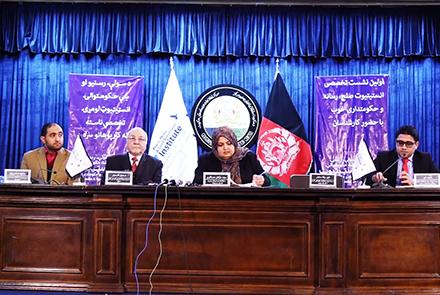The Afghan High Peace Council (HPC) Thursday said interference by regional countries and Pakistani military intelligence service (ISI) are hindering the Afghan peace process.
Pakistan’s intervention is the root cause of the ongoing war in Afghanistan, the HPC said.
“We are extremely concerned about Pakistan’s involvement, Pakistan must convince them (Taliban) to talk to us, I can say to you that there is something going on behind the scene,” said HPC member Mohammad Ismail Qasimyar.
Amid the HPC’s allegations, meanwhile, Sartaj Aziz, advisor to the Pakistani prime minister on foreign relations has accused the Afghan government of failing to forge a political consensus in order to get the much-awaited process back on track.
But, the HPC hit out over the accusations and instead held Pakistan’s ISI accountable for the peace talks deadlock between government and the Taliban.
The Afghan political elite and members of the public have often criticized HPC over its failure to make headway in the peace process. But HPC insists that it learned lessons from past mistakes when it comes to the issue of peace with the Taliban.
In a recent statement, Pakistan’s Aziz called upon the Afghan political leadership to avoid making illogical excuses and to stop blaming Pakistan for peace talks failure and instead come up with a more clear and comprehensive policy about the peace process.
There is an ambiguity within the Kabul policy on whether to treat the Taliban as terrorists or as a political power, said Aziz.
The HPC also criticized what it called the “zero outcome” of the ongoing war against terrorism.
“The United States, NATO and other friendly countries must sit with us and assess the issue in order to define a new strategy if they think that there previous policy has not worked,” said Qasimyar.
“We can say that HPC so far unfortunately has failed to achieve an outcome,” said Masoud Tarashtwal, head of Sustainable Peace Research Institute.
In addition, the Peace, Media and Good Governance Institute on Thursday discussed some key topics related to relations between the people and government, media and the peace process.
“The main purpose of our program is to boost relations between people, government and the media,” said Hamid Akbar, organizer of the institute for peace, media and good governance.
“Media and religious scholars have the ability to play a constructive role in restoring peace and stability in Afghanistan,” said deputy minister of information and culture for publications Sayeda Muzghgan Mustafawi.
Participants at the gathering also called for a wider role to be played by the media and religious scholars.
The peace talks between the Afghan government and the Taliban hit a deadlock last year following the death of the group’s former leader Mullah Akhtar Mansour in a U.S drone strike in Pakistan.


